 Petzlover
Petzlover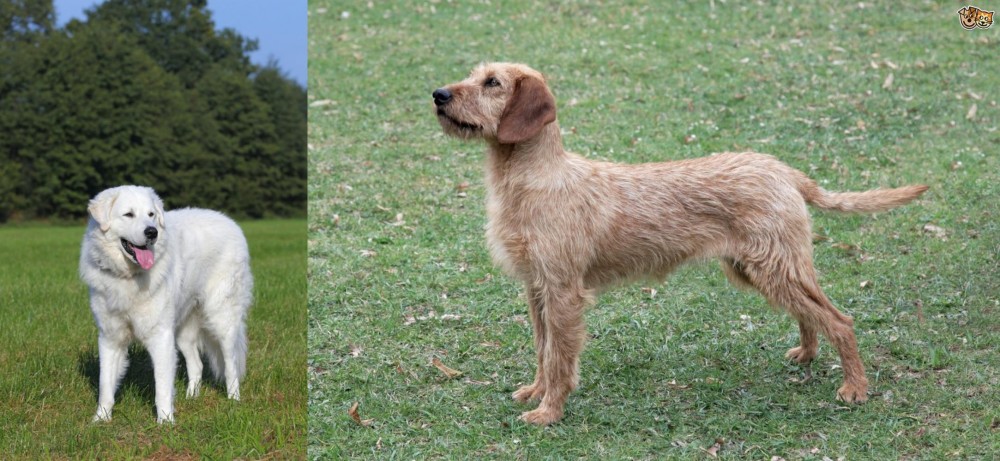 Kuvasz is originated from Hungary but Styrian Coarse Haired Hound is originated from Austria. Kuvasz may grow 23 cm / 10 inches higher than Styrian Coarse Haired Hound. Kuvasz may weigh 34 kg / 75 pounds more than Styrian Coarse Haired Hound. Both Kuvasz and Styrian Coarse Haired Hound has almost same life span. Both Kuvasz and Styrian Coarse Haired Hound has almost same litter size. Kuvasz requires Moderate Maintenance. But Styrian Coarse Haired Hound requires High Maintenance
Kuvasz is originated from Hungary but Styrian Coarse Haired Hound is originated from Austria. Kuvasz may grow 23 cm / 10 inches higher than Styrian Coarse Haired Hound. Kuvasz may weigh 34 kg / 75 pounds more than Styrian Coarse Haired Hound. Both Kuvasz and Styrian Coarse Haired Hound has almost same life span. Both Kuvasz and Styrian Coarse Haired Hound has almost same litter size. Kuvasz requires Moderate Maintenance. But Styrian Coarse Haired Hound requires High Maintenance
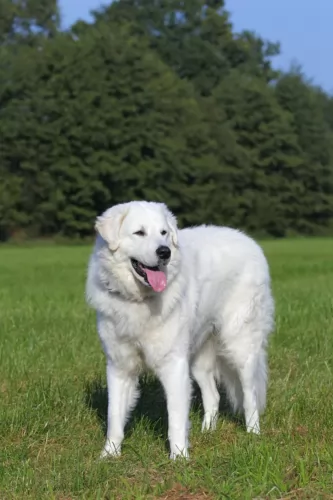 The Kuvasz is an ancient dog breed from Hungary. It is believed that the dog is the oldest of the ancient Hungarian dog breeds, and in fact a fossilized skeleton dating back to the 9th century, and almost identical to the modern Kuvasz, was found near Keszthely.
The Kuvasz is an ancient dog breed from Hungary. It is believed that the dog is the oldest of the ancient Hungarian dog breeds, and in fact a fossilized skeleton dating back to the 9th century, and almost identical to the modern Kuvasz, was found near Keszthely.
During the 15th century the Kuvasz became very sought after, being found in royal courts. Puppies were given as royal gifts. Later the popularity of the breed waned and then it was found in its traditional role of guarding livestock.
As Kuvasz numbers dwindled, breeding efforts were started but it is believed that other large dogs such as the Great Pyrenees were used with the Kuvasz to continue with the breeding programs.
In 1884, the first Hungarian standard for the breed was written. It was in 1966 that the Kuvasz Club of America was established.
 The Styrian Coarse Haired Hound is a German hound, a medium sized breed that was found to originate in Styria in Austria. It was bred to be a boar hunting scent hound in the mountains. The breed is an Austrian Bracke and one of the largest. In the 1870’s the breed was developed by Karl Peintinger to get a hardy, rough coated hunting dog. Peintinger took the Istrian Hound and an old type scent hound of Hanoverian and continued selective breeding until he got the dog he wanted.
The Styrian Coarse Haired Hound is a German hound, a medium sized breed that was found to originate in Styria in Austria. It was bred to be a boar hunting scent hound in the mountains. The breed is an Austrian Bracke and one of the largest. In the 1870’s the breed was developed by Karl Peintinger to get a hardy, rough coated hunting dog. Peintinger took the Istrian Hound and an old type scent hound of Hanoverian and continued selective breeding until he got the dog he wanted.
The breed is still used to hunt boar and track wounded animals. They work in high altitudes and rough terrains. They were not created to be companion animals and most of them are still working dogs. They do not make great house or family pets. Because of these circumstances, the breed is rare today.
Sometimes you will see the breed called the Peintinger Bracke after its developer. The Austrian Kennel Club recognized the breed in 1889 and the Federation Cynologique Internationale as a scent hound. The Styrian Coarse Haired Hounds were next recognized in 2006 by the United Kennel Club in North America, but not the AKC – American Kennel Club. There are many smaller kennel clubs and organizations for the breed as well many hunting clubs.
As mentioned, the breed is the largest of the Austrian Brackes. They are one of the three breeds included in the Grand Brackes. The name comes from the fact that all these dogs were developed for hunting in the Austrian mountains. They are pretty much unknown in the rest of the world. They thrive in the harsh climates of the Austrian mountains.
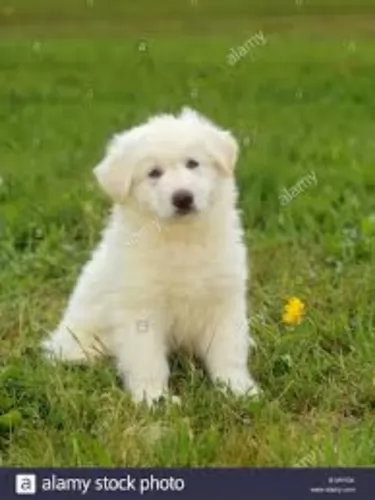 The beautiful Kuvasz is a large, muscled dog standing at 65 – 76cm in height and weighing 35 – 52kg. He has a double coat of dense white hair which can be straight or wavy.
The beautiful Kuvasz is a large, muscled dog standing at 65 – 76cm in height and weighing 35 – 52kg. He has a double coat of dense white hair which can be straight or wavy.
It is natural for the dog to lose most of the long coat during the Summer months. In other words this dog has a seasonal coat.
The nose is black, the eyes brown and alert, the ears are of medium length and floppy and the tail is carried long and low.
The Kuvasz is an intelligent dog who will benefit from training and socialization. It is always wise to have large dogs like this trained because just his size can cause problems if he isn’t obedient.
He is also described as a clownish type of dog which means he’ll entertain and amuse you. Certainly he is playful as a puppy but he calms down quite a bit as he grows into maturity. He is independent, and those who have owned such a dog report that he can be loving and loyal with his human family, wanting to guard and protect them. Others will say that he tended to be aloof, even with his human family.
Used as working dogs, the Kuvasz has learned to be independent and they will need a firm, strong owner who is also fair with them, otherwise they just do their own thing. They’re active dogs and because of their size they won’t suit city living where there is a tiny garden.
 The Styrian Coarse haired Hound is well muscled, medium sized and lithe. They run easily on all types and levels of terrain. Their coat is rough and harsh, giving the breed part of its name. They can tolerate both extremes of the climate temperatures. They are strong and confident dogs wearing a very serious facial expression. These guys are all about the job – the hunt. Their prey drive is extremely high.
The Styrian Coarse haired Hound is well muscled, medium sized and lithe. They run easily on all types and levels of terrain. Their coat is rough and harsh, giving the breed part of its name. They can tolerate both extremes of the climate temperatures. They are strong and confident dogs wearing a very serious facial expression. These guys are all about the job – the hunt. Their prey drive is extremely high.
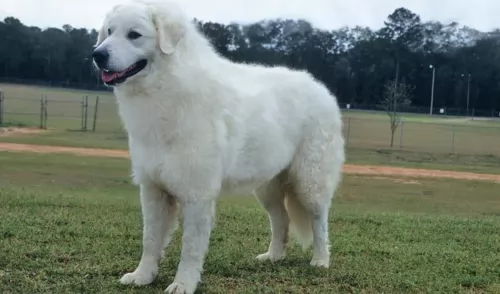 Kuvasz are guarding dogs, they’re intelligent and loyal, making them excellent family dogs with the right training and socialization.
Kuvasz are guarding dogs, they’re intelligent and loyal, making them excellent family dogs with the right training and socialization.
They’re able to get on well with other pets in the home as well as children. He is a beautiful dog and another bonus is that he isn’t particularly high maintenance.
As is common with many other large-breed dogs, he will have a shorter lifespan than what you’d get with a smaller dog breed, but if you feed him high quality food, exercise him and involve him in your activities, this large dog can become a wonderful friend and protector for you.
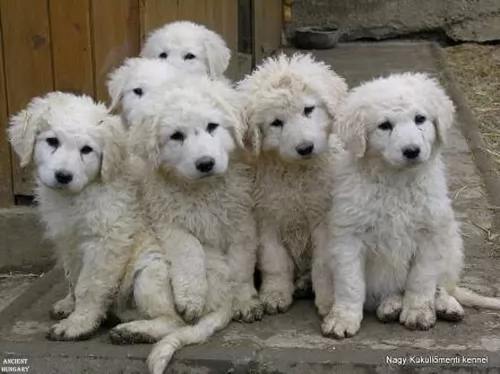 The large Kuvasz is a healthy dog breed that with good care can reach 12–14 years of age. Being the large dog that he is, he may well be prone to bone and joint problems. It is why good nutrition is so important for this dog - feeding him the best food with vitamins and minerals.
The large Kuvasz is a healthy dog breed that with good care can reach 12–14 years of age. Being the large dog that he is, he may well be prone to bone and joint problems. It is why good nutrition is so important for this dog - feeding him the best food with vitamins and minerals.
You know the saying ...you are what you eat... and this applies to dogs too. Good food can help to ward off serious illnesses. Big dogs like this often have to contend with hip dysplasia which can be both painful and debilitating as well as eye diseases.
This is where the eyelid of the dog rolls inwards, causing irritation and pain for the dog. There is also Ectropion, where the eyelid rolls outwards.If you see your pet has a red eye which is watery and which has pus, visit your vet. Entropion surgery will correct and repair and condition.
 The breed is fairly healthy and isolated from crossbreeding. They are susceptible to several major conditions.
The breed is fairly healthy and isolated from crossbreeding. They are susceptible to several major conditions.
• PRA or Progressive Retinal Atrophy = a group of degenerative, genetic eye diseases the cause blindness over time.
• Bloat – most large dogs suffer from this and not so much a medium breed like this one, but it is a condition that their energy levels and work ethics could lead to. Fatal if not treated immediately.
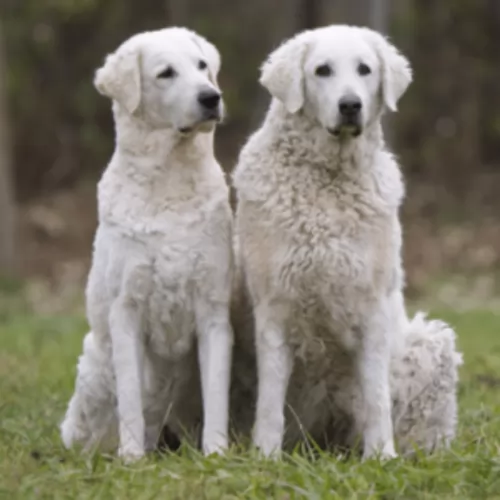 The coat may be fairly long and thick but it doesn’t require any special kind of grooming. A good brush twice a week will be adequate and will help with getting rid of stubborn knots and matting.
The coat may be fairly long and thick but it doesn’t require any special kind of grooming. A good brush twice a week will be adequate and will help with getting rid of stubborn knots and matting.
He is a seasonal shedder and this frequent brushing will make sure the coat remains groomed and shiny.
The Kuvasz is a hardy breed who just loves the outdoors. He is a dog that doesn’t do well in the heat. Make absolutely sure that he has a cool, sheltered spot where he can lie down. Ensure that there is always a bowl of fresh, cool water available to him.
There is quite a bit of conflict and controversy regarding nutrition in dogs. The idea is to keep it simple. If you buy a commercially manufactured dog food, check the ingredients on the packaging.
You want to be sure your pet is getting vitamins and minerals in instead of preservatives, fillers and colorants. Try and give him some home made food too such as some chicken, brown rice or pasta and some vegetables. You can mix this into his dry kibble occasionally with a little bit of raw meat too when you have.
Avoid feeding your dog things such as chocolates, nuts, onions, sweets and chips.
 1Feeding the puppy – Feed this very active breed a high quality dog food for medium sized dogs. Feed puppies 3-4 times a day a total of ¾ to 1 cup.
1Feeding the puppy – Feed this very active breed a high quality dog food for medium sized dogs. Feed puppies 3-4 times a day a total of ¾ to 1 cup.
2.Feeding the adult - feed this very active breed a high quality, high protein diet. Feed the adult 1-2 times a day a total of 1.6 cups of dry food.
4. Games and Exercises They are energetic, athletic and extremely agile. They are muscular and lithe and need a lot of exercise. The is a dog that can travel across rough terrain for hours at a time. They are tenacious hunters and need an outlet for that prey drive.
They need space and time to run. A large yard is great because you don’t want to take them to a dog park. Give them a lot of toys and puzzles. They excel at lure coursing, field trials and hunting trials. Their sense of smell makes them great at nose work and they like agility, tracking and rally obedience.